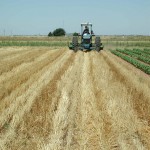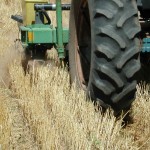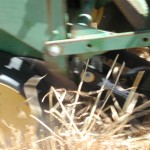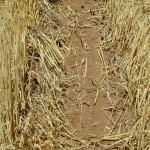John W. Sij, Todd A. Baughman, Stan J. Bevers and Jason P. Ott
Overview
There are thousands of acres of conventional-tilled irrigated cropland in Texas and Oklahoma that result in little residue cover during fallow periods. Wind and water erosion can cause significant soil losses during this time. In addition, excessive tillage increases carbon loss from the soil and reduces the physical structure of the soil. No-till or reduced-till production systems provide significantly higher levels of crop residue on the soil surface when managed properly. Increased crop residue decreases wind and water erosion by holding the soil in place and decreasing the velocity at which water flows over the soil surface. Crop residue also sequesters more carbon in the soil, thus increasing organic matter. The following results are from two years of study that compares two crops in two years using conventional production systems with three crops in two years and four crops in two years using reduced-till and no-till systems. Cotton lint yields for 2001 have not been determined as of this writing. Cotton yields were estimated from boll counts. Wheat for the upcoming 2001-2002 season has been planted in conventional-till plots in anticipation of securing funding from the Wheat Board for 2002.
Pictures
Planting sorghum or cotton into wheat stubble
Discussion and Initial Conclusions
- Net return was highly sensitive to variety adaptability, price, and weather
- High wheat yields in 2000 and moderately high wheat yields in 2001 failed to produce profitable returns, due largely to low wheat prices
- Sorghum was not a good rotational crop due to unacceptable returns
- Planting and harvesting timelines are critical in order to receive sufficient heat units to mature cotton
- Water requirements were high for summer annual crops the last two seasons
- Cotton lint yield was highly influenced by variety and environmental factors
- No abnormal weed/insect problems were observed in any cropping system
Progress Reports
Acknowledgement
We wish to acknowledge The Texas Wheat Board for financial support.



